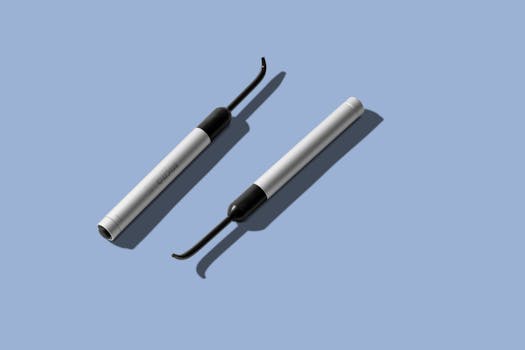What should you bear in mind when having your teeth cleaned?
Professional teeth cleaning is one of the most important things you can do to maintain good dental health. It removes stubborn plaque that you can't get rid of with daily brushing alone. But what should you bear in mind? In this blog post, you'll learn everything you need to know about professional teeth cleaning – from preparation to aftercare. We'll answer frequently asked questions and show you why professional teeth cleaning is essential for healthy teeth and a radiant smile.

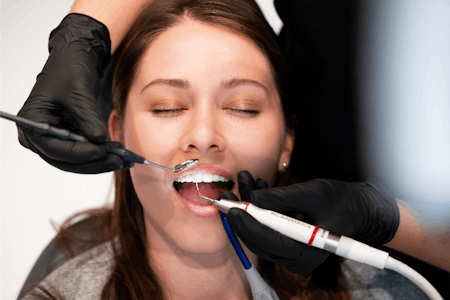
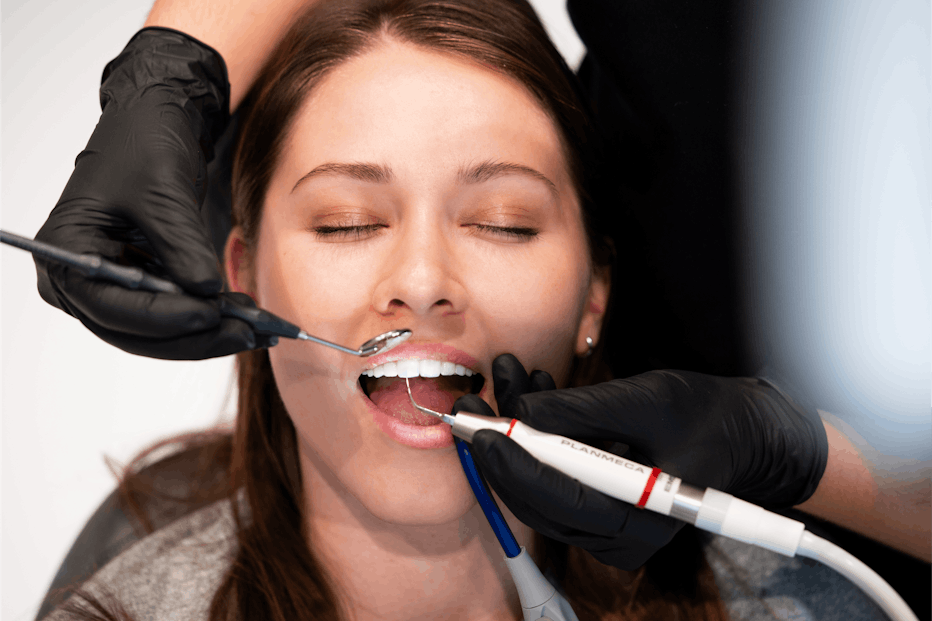
- Why is professional teeth cleaning important?
- What happens during a professional teeth cleaning?
- How often should you have a professional teeth cleaning?
- What should you bear in mind before a dental cleaning?
- What is particularly important after a teeth cleaning?
- What can you do about bleeding gums and sensitive tooth necks?
- Visiting the dentist and statutory health insurance: what is covered by the insurance?
- Final word
Why is professional teeth cleaning important?
Even if you brush your teeth carefully every day, floss and maybe even integrate interdental brushes into your oral care routine, there are areas in your mouth that are difficult to reach. In particular, stubborn plaque builds up over time in the spaces between the teeth and at the edges of the gums. These consist of bacteria that multiply on food particles and saliva deposits. Over time, these soft dental plaques harden into tartar – a problem that you can no longer get rid of with normal tooth brushing. This is exactly where professional tooth cleaning comes into play.
Plaque and tartar as a risk factor for dental health
Tartar, which forms in hard-to-reach places, is not only an aesthetic problem. The bacteria that live in the plaque and tartar release acids that attack the enamel and can cause cavities. These deposits often lead to gum inflammation because they irritate the gums and make them more susceptible to infections. If left untreated, these inflammations can develop into serious gum diseases such as periodontitis. Periodontitis is a chronic inflammation of the tissues that support the teeth and gums, which, if left untreated, can even lead to the loss of teeth. A professional teeth cleaning is therefore not just a cosmetic measure, but an important precaution to prevent serious dental diseases.
Remove discolouration for a radiant smile
In addition to the health aspect, aesthetics also play a major role in professional teeth cleaning. Discolouration of the teeth is often a result of foods and drinks that contain colouring agents – such as coffee, tea, red wine or even certain spices like turmeric. Even with thorough dental care, these stains can affect the colour of your teeth over time, giving them a dull, discoloured appearance.
While regular toothpastes often only remove superficial dirt and stains, professional teeth cleaning can get rid of deeper stains and make your teeth appear brighter again. In particular, the use of Air-Flow devices and special polishing pastes thoroughly cleans and smoothes the tooth surface. This not only removes discolouration, but also helps to protect your teeth against future deposits, as plaque finds it harder to adhere to smooth surfaces.
Smoother tooth surfaces for better oral hygiene
Another important advantage of professional teeth cleaning is that the tooth surfaces are noticeably smoother after the treatment. This is not only a pleasant feeling, but also has practical advantages for your daily oral hygiene. Smooth teeth provide less surface area for bacteria and plaque to attack, giving you better control over your dental health between appointments for professional teeth cleaning. It also makes brushing and flossing easier because the plaque offers less resistance.
Gum care through professional teeth cleaning
Your gums also benefit from professional teeth cleaning. Tartar and plaque that collect at the edges of the gums can lead to gum inflammation. This often manifests itself in bleeding gums when brushing or flossing. Such signs should not be taken lightly, as they are often harbingers of more serious problems. Professional teeth cleaning helps to prevent these inflammations by removing the plaque that irritates the gums. Healthy gums are not only the basis for healthy teeth, but also contribute significantly to overall oral health.
Preventing tooth loss and dental disease
Tooth loss due to periodontitis or advanced caries is a serious risk that can be significantly reduced by regular professional tooth cleaning. By regularly having stubborn plaque removed from your teeth, you minimise the risk of deep inflammation that weakens the periodontium. This means that you not only maintain your dental health, but also avoid high treatment costs that can arise from dental prostheses or periodontitis treatments.
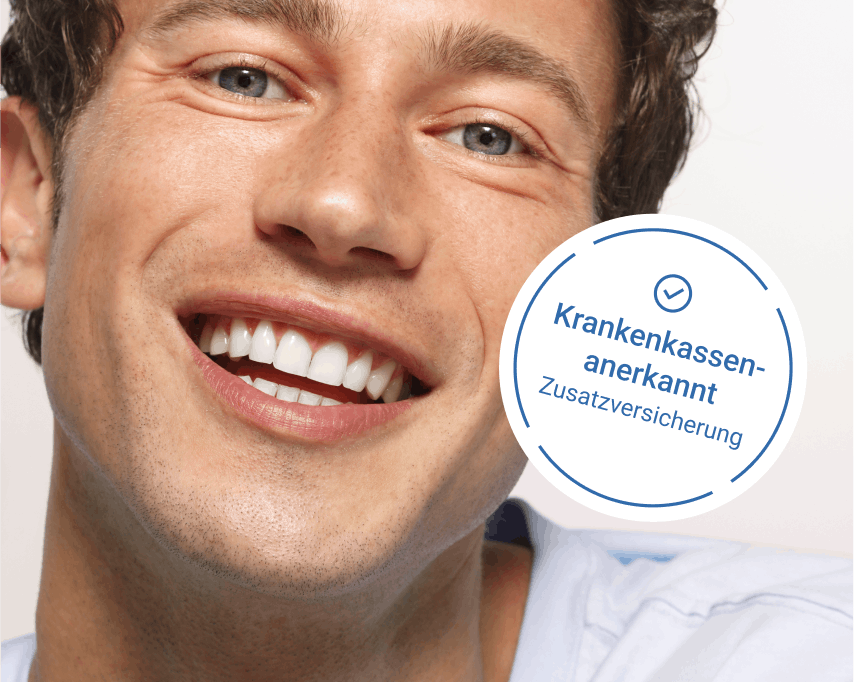
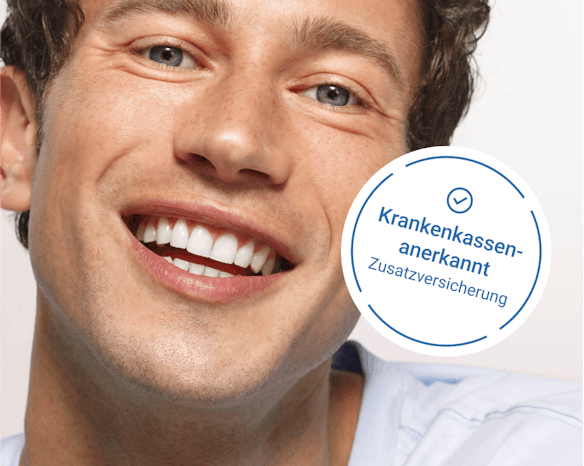
For a healthy mouth and beautiful teeth, regular professional teeth cleaning is essential. Our specialists detect early signs of caries and prevent them.
- Personalised dental hygiene
- Gum check & caries control
- Painless cleaning with AIRFLOW
What happens during a professional teeth cleaning?
A professional teeth cleaning is usually carried out by a dental hygienist at the ALPINE WHITE studio or at a dental practice. Various techniques and instruments are used to thoroughly clean your teeth. First, stubborn plaque and tartar are removed with special hand instruments or ultrasound devices. These devices use vibrations to gently remove the hard deposits.
After that, the interdental spaces are cleaned, where food particles or plaque often hide. Dental floss or interdental brushes are used here to reach those hard-to-reach areas. This is important to prevent tooth decay and gum inflammation.
Finally, the teeth are polished with special pastes and air-flow devices to make the surfaces smooth and clean. This helps to prevent new plaque from forming. Fluoridation provides additional protection for your teeth by strengthening the enamel.
How often should you have a professional teeth cleaning?
The frequency of professional teeth cleaning depends largely on the condition of your teeth and gums. In general, it is recommended to have a professional teeth cleaning at least once a year. However, if you tend to bleed or have gum disease such as gingivitis, you should have it done more often.
A professional teeth cleaning is also particularly important for people with dentures, as plaque can more easily collect on prostheses or bridges. If you are having orthodontic treatment, it is advisable to have a professional teeth cleaning done regularly to avoid plaque in hard-to-reach places.
What should you bear in mind before a dental cleaning?
There are a few things you should be aware of before a dental hygiene appointment. If you have inflamed gums, you should tell your dentist, as the gums may be more sensitive to the cleaning in this condition. Exposed tooth necks or periodontitis can also pose a challenge, so a thorough check before the treatment is important.
If you suffer from bad breath, a professional teeth cleaning can be particularly helpful as it reduces the bacterial load in the mouth. Often, it is stubborn plaque or inflammation in the gum pockets that cause bad breath.
What is particularly important after a teeth cleaning?
After a dental hygiene appointment, you should take extra care with your dental care to maintain the results achieved for as long as possible. This is because after a thorough cleaning, your teeth are not only free of plaque and discolouration, but they are also particularly smooth and sensitive. With consistent follow-up care, you can ensure that your oral health remains at a high level and prevent new deposits.
Intensify your regular dental care
Your teeth will be in optimal condition immediately after a professional clean, but plaque can quickly accumulate again, especially in the interdental spaces, which are often difficult to access. That's why it's important to incorporate dental floss or interdental brushes into your daily dental care routine. These help to thoroughly remove food particles and plaque in the interdental spaces, where cavities often develop first. Interdental brushes are particularly effective for cleaning between teeth with narrow interdental spaces or exposed tooth necks and for preventing gum irritation.
Mouthwash as a supplement
In addition to mechanical cleaning with a toothbrush and dental floss, mouthwashes can be a further step in your daily routine. They help to reduce bacteria in the oral cavity, which is particularly useful after professional tooth cleaning, as the gums may still be somewhat sensitive after the removal of tartar and plaque. Mouthwashes with antibacterial ingredients promote gum health and prevent inflammation.
Pay attention to your diet
In the days following your teeth cleaning, you should take extra care to avoid colouring foods such as coffee, tea, red wine, beetroot and spicy foods. Your teeth are particularly smooth after polishing and can be more susceptible to new discolouration. A temporary switch to less colouring foods can help to preserve the lighter tooth colour for longer. Of course, this doesn't mean that you have to avoid these foods permanently – but you should take extra care immediately after your professional teeth cleaning to ensure the best possible results.
Fluoride protects your teeth
Another important point is choosing the right toothpaste. Make sure you use a toothpaste with fluoride to strengthen your tooth enamel and reduce the risk of cavities. Fluoride hardens the enamel and makes it more resistant to acid attacks that can result from consuming foods that are high in sugar and acid. Special fluoride mouthwashes can also be used to provide additional protection for your teeth. Use our whitening toothpastes from ALPINE WHITE.
Gentle care for sensitive gums
If your gums are sensitive after a professional cleaning, you should use particularly gentle dental care products for the first few days. Toothpastes that have been developed for sensitive teeth and gums can help to prevent irritation. A soft toothbrush is also gentle on your gums and ensures that you do not irritate them further.
Follow-up care at ALPINE WHITE
It may also be useful to schedule regular check-ups with your dental hygienist to ensure that your oral health remains stable after the professional teeth cleaning. If your hygienist finds signs of gum disease or cavities during the cleaning, more frequent monitoring may be useful to take early action.
By integrating these follow-up measures into your daily dental care routine, you can maintain the results of your professional teeth cleaning in the long term and optimally support your dental health. Investing in good oral hygiene pays off – for a healthy smile and fewer visits to the dentist.
What can you do about bleeding gums and sensitive tooth necks?
If you experience bleeding gums during or after a professional teeth cleaning, it could be a sign of gum disease. In such cases, it is important to maintain thorough oral hygiene and to have regular check-ups with your dentist. Tooth necks A toothpaste specially formulated for sensitive teeth can help by protecting the enamel and providing relief. Use our whitening toothpaste Sensitivity Relief for this purpose.
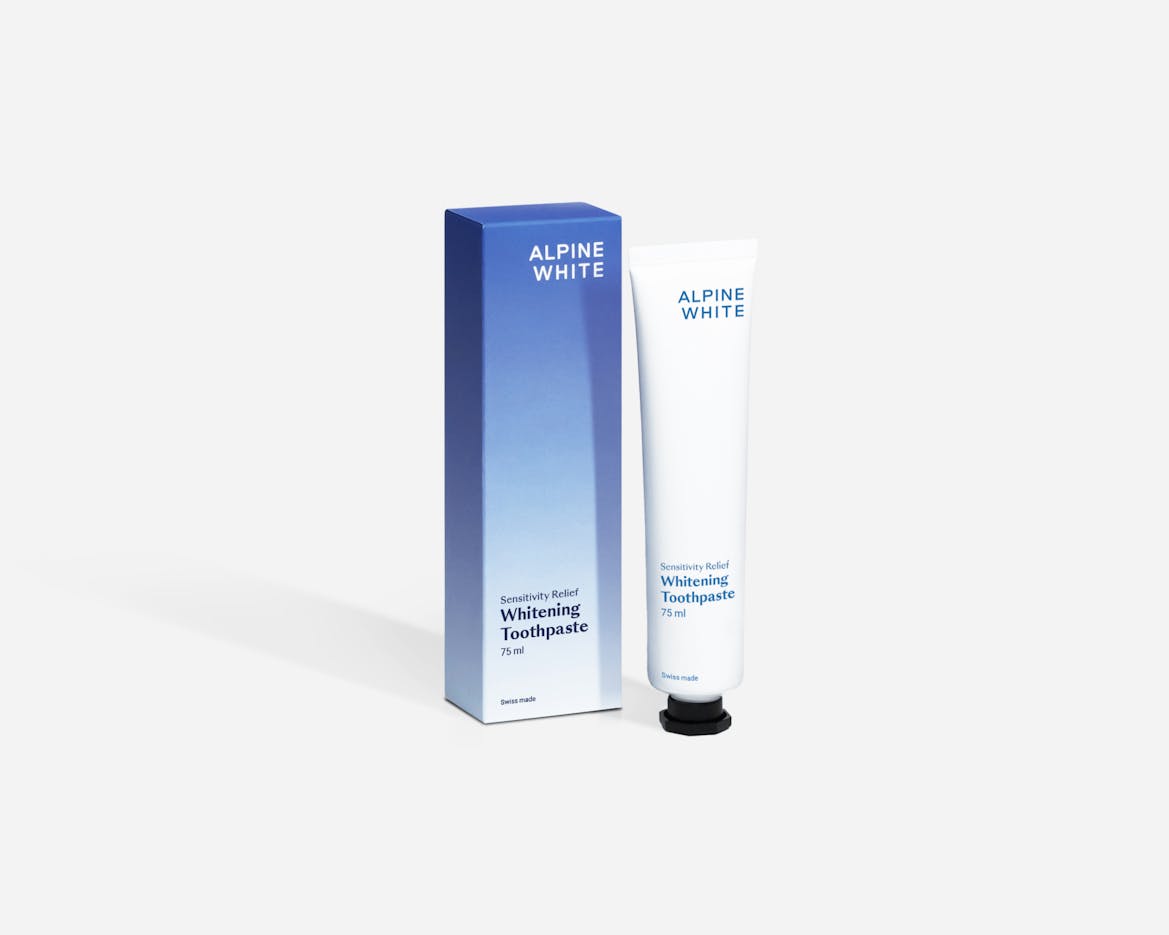
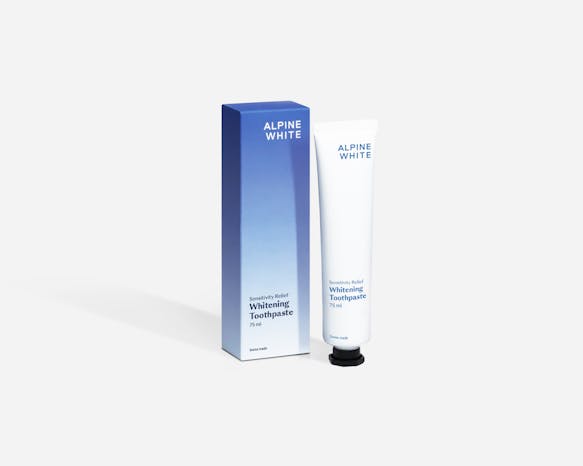
Reduces tooth sensitivity while gently restoring your teeth's natural whiteness. Swiss made.
Comprehensive dental hygiene at ALPINE WHITE
At ALPINE WHITE, your oral health is our top priority. Our specially trained dental hygienists offer you comprehensive dental care that not only includes a thorough cleaning, but also focuses on long-term dental health. We place a high value on effective dental prophylaxis, which removes stubborn plaque and polishes your teeth to make them shine again. We also remove stains from food and drinks so that your teeth regain their natural colour. With modern techniques, we clean even hard-to-reach spaces to prevent cavities and gum disease. Good oral hygiene starts with regular treatments – don't wait to book your appointment at ALPINE WHITE to take your dental health to the next level.
Stubborn tooth discolouration?
Tooth discolouration often occurs as a result of consuming colouring foods such as coffee, tea, or red wine, but also from smoking and insufficient oral hygiene. At ALPINE WHITE, we can effectively remove this discolouration using a combination of professional dental hygiene and gentle bleaching. First, dental hygiene thoroughly removes stubborn plaque and superficial discolouration, while the interdental spaces and gums are also optimally cared for. Subsequently, a peroxide-free bleaching ensures that deeper discolourations are gently lightened without damaging the enamel. This way, you not only achieve a radiant result, but also protect your dental health in the long term.


Gentle and effective whitening for healthy teeth: We combine bleaching and dental hygiene for the best results.
- Naturally white teeth
- Effective tooth whitening without peroxides
- Gentle tooth cleaning with AIRFLOW
Visiting the dentist and statutory health insurance: what is covered by the insurance?
Professional teeth cleaning is not always fully covered by statutory health insurance. However, it is worth asking your health insurance company whether some of the costs will be covered. Some insurance companies now offer subsidies for professional teeth cleaning, as it is considered an important measure for dental health.
Final word
Regular professional teeth cleaning is an important part of maintaining healthy teeth. It not only helps to remove stubborn plaque and discolouration, but also protects against cavities, gum inflammation and periodontitis. Make sure to book regular appointments at your dental practice and consistently follow up on your dental care after your professional teeth cleaning. This way, you can ensure that your teeth stay healthy and radiant – and you can enjoy your smile without a care.

